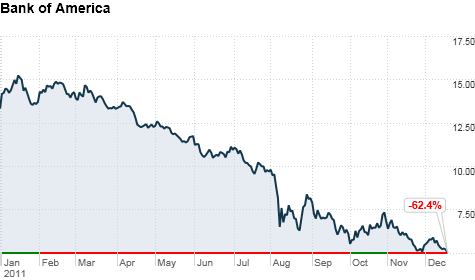Occupy vs. Bank of America
A massive campaign ensued to justify that , an organization who was involved in delivering hidden fees - could then simply take them from their customers by outright means. Such action is the essence of corporate hubris. And Occupy answered.
We, as a country - now fully embrace Occupy. Fully one out of every two Americans see Occupy as a positive force. Occupy - after global success, has now moved to your neighborhood - and stands for the Occupation of your own neighborhood. And it stands for wise choices in your personal finance.
Fortunately for Occupy - the millions spent in sponsored "placement advertising" that were the mainstay of corporate talk radio and news media entertainment - were unable to break the hold on the American imagination of a better life. And just this once, perhaps - we can see its direct effect on an institution that not only played a significant role in the great crash of 2008, but also attempted to shut down WikiLeaks, and try to rip off its own customers with fees. It is neither a conservative, nor liberal viewpoint - to see the action of a free and informed market upon such an institution - and the effect, in summer of 2011 - of Occupy - and the simple act of informing fellow Americans that there are better ways to work with their finance- and that they simply do not have to subject themselves to untenable fee. If you are still drinking the Anti-Occupy Kool-Aid, perhaps the graph below will act as a wake-up call that your partisan view of the organization might cost you more than you think. This is not a movement centered in partisan politics. It is a movement centered in the basics of finance, ethics, and sanity - targetted to the elimination of the monied corruption of democracy.

This chart is simple, but the story it tells is complex. We, as a movement - do not stand against business. But a market without regulation is one in which larger organizations utilize corruption to maintain their position at the expense of innovation and competition. A stock's value does not indicate anything more than the price at which others are willing to take an ownership stake in the enterprise and product it represents.
But that decision, whether to buy or sell - should be based on a deep sense the direction in which the company is going, and where it has been.
It is the intent of Occupy to help the 99% to save money, and make more of it. Sadly, this will mean that those who willfully distort their rationale for fees and participate in market instruments that destabilize their stock value - will end subject to a larger market picture of stock purchase than that the 1% can afford to underwrite. There will be no JP Morgan walking the floor of Wall Street, rallying the buyer to save Bank of America.
Comments